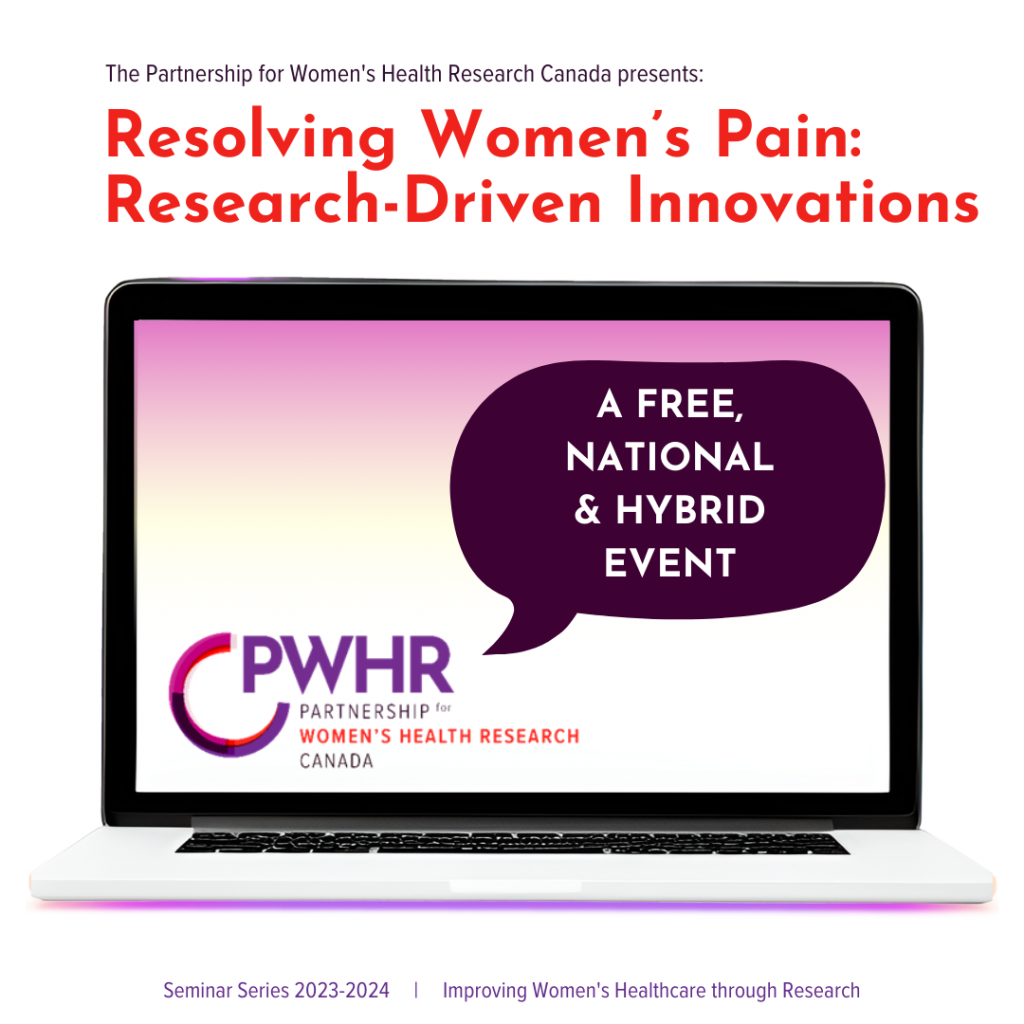
Chronic pain affects 8 million people in Canada—and 60-70% of them are women.
In November, National Pain Awareness Month, the Partnership for Women’s Health Research (PWHR) hosted its second Women’s Health Seminar at the Women’s Health Collective Canada (WHCC) National Women’s Health Summit.
These statistics foregrounded presentations by four Canadian researchers at PWHR’s partner research institutes who are driving clinical advancements and multidisciplinary approaches to help women manage—and in some cases, resolve—their pain.
meet our speakers

Dr. Allana Munro, BSc Pharm, M.D., FRCPC
Topic: A novel approach to optimizing labour analgesia using Programmed Intermittent Epidural Bolus (PIEB)
Summary: Programmed intermittent epidural bolus (PIEB) is a relatively new method of maintaining epidural labour analgesia. PIEB, when compared with the standard continuous epidural infusion (CEI), has the potential advantage of greater spread within the epidural space and better sensory blockade. Studies have demonstrated a local anesthetic-sparing effect, less instrumental vaginal deliveries, decreased motor blockade, and improved maternal satisfaction with PIEB compared with CEI. However, the optimal PIEB regimen and pump settings remain unknown. The PIEB bolus size and interval as well as the PIEB start time delay period can influence the efficacy of PIEB used for epidural labour analgesia. This presentation will summarizes the role of PIEB for the maintenance of labour analgesia, provide evidence that PIEB maintains epidural labour analgesia more effectively than continuous epidural infusions and discuss current knowledge regarding PIEB impact on obstetric outcomes. A review of the research available to suggests optimal settings will be provided, including a novel approach using Response Surface Methodology. Limitations and future strategies to optimize utilization will be suggested.
Biography: Dr. Munro completed Medical School and Anesthesia training at Dalhousie university and went on to attain a IWK Women’s and Obstetric Anesthesia Clinical / Research Fellowship in 2015. She joined the IWK Women’s and Obstetric Department of Anesthesia as an anesthesiologist in 2016 and competed additional training in chronic pain. She is currently an Associate Professor at Dalhousie University and Associate Medical Director of Research in the Department of Anesthesia, Pain Management & Perioperative Medicine in Halifax, NS. Her current research program is focuses on improving labour analgesia, the relationship between labour analgesia and postpartum psychiatric disorders and the experiences and impacts of Women’s Chronic Pelvic Pain.

Dr. Erin Kelly, M.D., Clinical Assistant Professor
Topic: An integrative approach to chronic pelvic pain care
Summary: An integrative and multidisciplinary approach to the management of chronic pelvic pain (CPP), with a focus on the bio-psycho-social model —- Our current research projects include: 1) Systematic review of pelvic floor trigger point injections for the management of CPP. 2) A survey cannabis use for analgesia in women with chronic pelvic pain. 3) Patient and health care providers experience and perspective of a hypnosis-based program within a multidisciplinary care model for chronic pelvic pain. 4) Mindfulness Cognitive Behavioral Therapy for the management of vulvodynia and myofascial pelvic pain. 5) Chronic hip injuries in women and their implications for chronic pelvic pain.
Biography: Dr. Erin Kelly is a Urogynecologist at the Lois Hole Hospital for Women in Edmonton, Alberta, Canada and a Clinical Associate Professor in the Department of Obstetrics and Obstetrics and Gynecology at the University of Alberta. She is also the Fellowship Program Director for the Female Pelvic Medicine and Reconstructive Surgery program, and a member of the Health Research Ethics Board – Biomedical Panel at the University of Alberta. Dr. Kelly completed residency and fellowship in FPMRS at Western University. In addition to a full-time academic practice in Urogynecology, Dr. Kelly also provides care through the Chronic Pelvic Pain program at the Lois Hole Hospital for Women. She is an active clinical researcher and her research interests include chronic pelvic pain management, patient education and quality improvement.

Dr. Luis Nacul, MD, Ph.D
Topic: Chronic Fatigue Syndrome and other complex chronic diseases: Advances in diagnosis and treatment
Biography: Researcher (PhD) and clinician (MD) with dual specialty in general practice and public health, Dr Luis Nacul has been researching ME/CFS internationally, and practicing as a general physician and in the field of ME/CFS and other complex chronic diseases. He is the Director of Complex Chronic Diseases Program (CCDP) Research Group in Canada, and has been the co-founder and Director of CureME Research Programme at the Clinical Research Department, at the London School of Hygiene and Tropical Medicine in the UK. He is Clinical Associate Professor at the University of British Columbia and LSHTM. Dr Nacul has worked in in Brazil, UK and Canada, where he had served as medical director for CCDP for nearly 4 years. In addition to clinical and research work, with emphasis on chronic and disabling diseases, he has contributed to teaching and supervision of doctors and researchers. He is a Board Member of the International Association of ME/CFS, and has contributed to various committees in the field of ME/CFS, such as EUROMENE, NICE Guidelines development committee on ME/CFS, ICanCME (as network executive) and UK ME/CFS Biobank Steering Committee.

Dr. Rachael Bosma, Ph.D
Topic: Rapid access to care for people living with pain: Creation and implementation of the Power Over Pain portal
Summary: Pain is ubiquitous to many medical conditions. Chronic pain affects ~8 million people living in Canada, and this number is anticipated to rise 17.5% by 2030. Many pain patients facing wait-times of up to 2 years or more for clinician consultation leading to a deterioration in functioning, and quality of life. Although we know that certain populations bear more of the burden, particularly vulnerable sectors such as women, elderly, Indigenous Peoples, and certain ethnic minorities, access to pain care and resources is not equitably distributed. Power Over Pain is a direct response to calls from patients for better access to pain care. Power over Pain is a virtual portal co-designed by a diverse group of researchers, clinicians, and people living with chronic pain to provide rapid access to evidence-based virtual stepped care interventions for chronic pain across the lifespan. In this presentation, Dr. Bosma will provide an overview of the Power over Pain portal, outlining the different components of participant registration, self-assessment tools, and evidence-based virtual chronic pain interventions. She will also describe the development process and partnerships that were cultivated to bring together and integrate the plethora of evidence-based interventions that live on the portal. Furthermore, she will share the results of pilot implementation in different settings and highlight lessons learned to support improved pain care across our health systems. Finally, she will raise future opportunities for research and will share resources for implementation into clinical practice.
Biography: Dr. Bosma is an Assistant Professor (status) of Pain and Neuroscience in the Faculty of Dentistry at the University of Toronto and is the Co-director of the University of Toronto Centre for the Study of Pain. Her research program is embedded in the Toronto Academic Pain Medicine Institute at Women’s College Hospital where she trials innovative solutions in virtual healthcare interventions with a focus on women’s health. Dr. Bosma is an early career investigator who has received ~$13-million (~$10-million as a co-PI) in funding and has published ~ 30 peer reviewed manuscripts. Dr. Bosma is co-leading the Strategy for Patient-Oriented Research, National Training Entity (SPOR NTE) which serves as a central body for POR training and mentoring across Canada and also serves as an executive member and is the co-chair of the Research and Evaluation Committee at the level of the Ontario Ministry of Health Chronic Pain Network.
